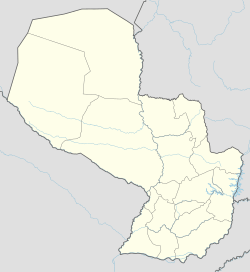Ñumí facts for kids
Quick facts for kids
Ñumí
|
|
|---|---|
| Ñumí | |
| Country | Paraguay |
| Department | Guairá |
| Founded | 1955 |
| Area | |
| • Total | 324 km2 (125 sq mi) |
| Population
(2008)
|
|
| • Total | 3,637 |
| • Density | 11/km2 (30/sq mi) |
| Time zone | -4 Gmt |
| Postal code |
5280
|
| Area code(s) | (595) (543) |
Ñumí (in Guaraní: Ñumi) is a district in the Guairá Department of Paraguay. It is located south of Villarrica, the capital city of the department. It is also east of the San Salvador district.
Ñumí is connected to these areas by good roads. It is about 198 kilometers away from Asunción, the capital of Paraguay. You can reach Ñumí by following Route 8 "Doctor Blas Garay".
Most people in Ñumí work in farming. They also used to work with wood, but this has become less common recently.
Contents
Geography and Landscape
The area around Ñumí has many low prairies. The district covers an area of 324 square kilometers. In 2008, about 3,637 people lived here. This means there were about 11 people per square kilometer.
Neighboring Areas
- To the North: The city of Villarrica and the Ybytyruzú Cordillera mountains.
- To the South: The Iturbe district.
- To the West: The San Salvador district.
- To the East: The Eugenio A. Garay district.
Rivers and Streams
Two streams flow through the Ñumí district:
- Yhacá Guazú
- Remansito
Population and Community Life
Here are some facts about the people living in Ñumí:
- About 34.5% of the population is under 15 years old.
- On average, women have about 2.9 children.
- About 11.1% of people cannot read or write.
- Most working people (59.3%) are in farming.
- About 11.2% work in factories or construction.
- About 28.2% work in services like shops or offices.
- Most homes (91.6%) have electricity.
- About 19.9% of homes have running water.
In 2008, out of 3,637 people, 1,899 were males and 1,738 were females. Most of the population (74.21%) lives in rural areas.
Economy and Farming
The people of Ñumí grow many different crops. These include wheat, sugar-cane, tobacco, cotton, and grapes. Farming is a very important part of their economy.
Roads and Getting Around
The most important road for Ñumí is Route 8 "Doctor Blas Garay". This road connects the district to Villarrica, the capital of the department. It also links Ñumí to Asunción and other places in Paraguay.
Other roads within the district are made of dirt or gravel. This makes it easier for people to travel between different parts of Ñumí.
Communication Services
Ñumí has phone services from Copaco and mobile phone networks. People can also read newspapers from the country's capital.
Public Transportation
The district has modern buses for traveling to the capital city and other departments. For trips within Ñumí, there are smaller buses available.
How to Visit Ñumí
If you want to go to Ñumí from Asunción, here's how: 1. Follow Route 2 "Mariscal José Félix Estigarribia" until you reach Coronel Oviedo. 2. From there, take the detour onto Route 8 "Doctor Blas Garay". 3. This route will take you through the Yataity district and the city of Mbocayaty. 4. Keep following the same route to reach Villarrica. 5. From Villarrica, travel about 22 kilometers south, and you will arrive in Ñumí.
Tourism and Nature
Ñumí is a great place for enjoying nature. You can experience rural tourism and even go on wild safaris.
The district is home to Cerro Corá hill, which is 435 meters high. The Ybytyruzú Cordillera mountains are also in this area. These mountains branch off from the Caaguazú Cordillera, which is one of the most important mountain ranges in Paraguay. The sides of these mountains are covered in beautiful plants and trees.
Local Celebrations
Every year on June 10, Ñumí celebrates its Patronal Celebration. This event honors the district's patron saint, the Sacred Heart of Jesus. The image of the saint is kept in the church with the same name.
The festivities begin with a novena (nine days of prayer) every afternoon. On the evening of June 9, there is a big party at the municipal shed.
On June 10, a special Mass is held at 8 AM with the district's priest. After the Mass, there is a procession with a small band. In the afternoon, people enjoy a barbecue, horse riding, and bullfights.
See also
 In Spanish: Ñumí para niños
In Spanish: Ñumí para niños
 | Selma Burke |
 | Pauline Powell Burns |
 | Frederick J. Brown |
 | Robert Blackburn |


